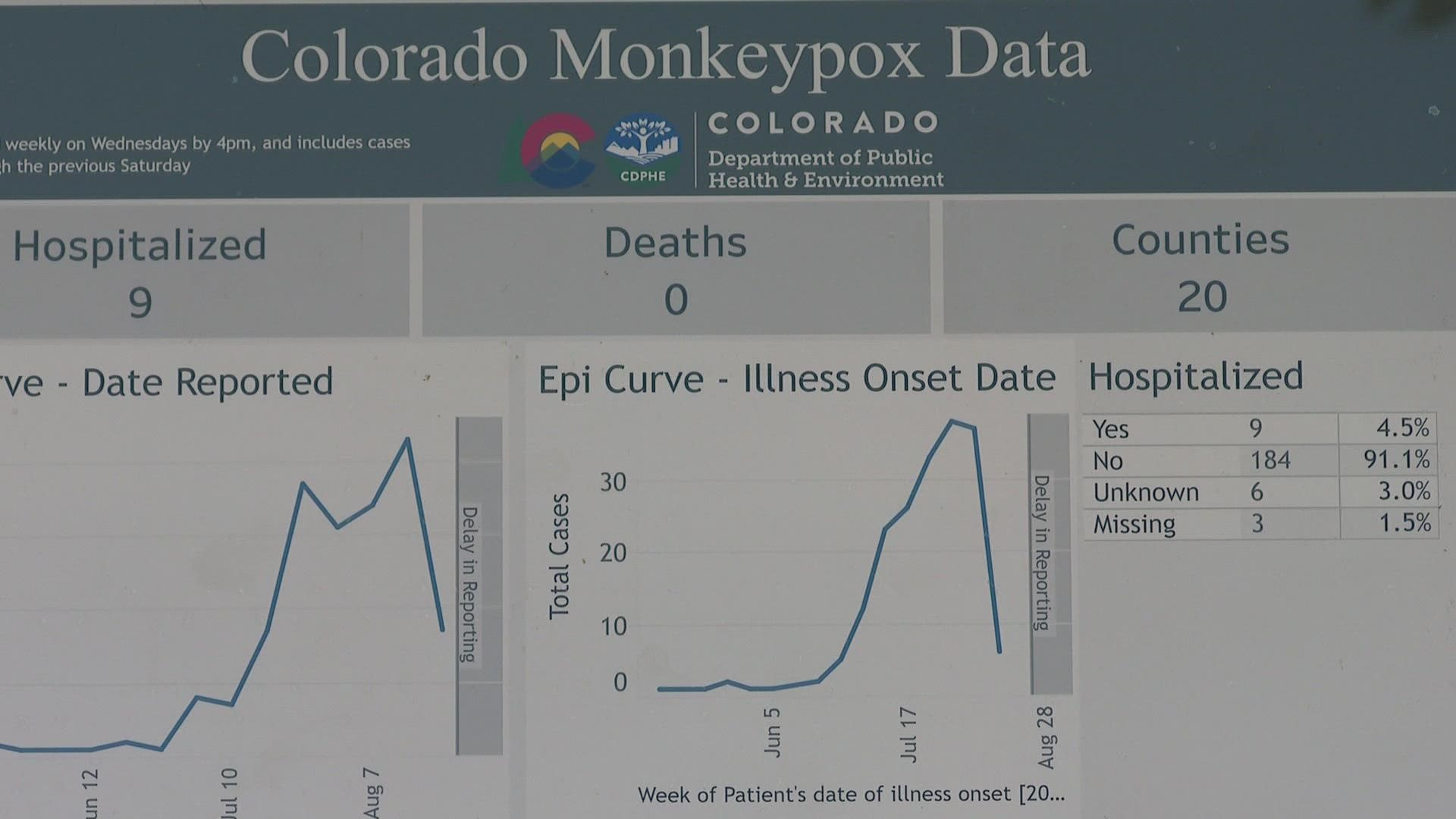COLORADO, USA — The Colorado Department of Public Health and Environment has reported three new cases of monkeypox in September, bringing the state's total to 235 since May.
CDPHE recently expanded eligibility for the vaccine, but they are still working to get more providers to enroll in the program to distribute it.
Colorado Springs resident Jacob Foreman found it difficult to get a dose last month. He told 9NEWS he was offered appointments at clinics 60 miles north in the Denver metro area.
"I was like, 'This is great. I live 60 miles south in Colorado Springs. Why are there none here?'" he said. "I'm definitely hoping there's going to be more [clinics], for sure."
9NEWS spoke with Diana Herrero, CDPHE's Deputy Director of the Division of Disease Control and Public Health Response. She discussed the efforts being made to provide monkeypox vaccine access to all.
(Editor’s note: This interview has been edited for context and clarity.)
9NEWS: Vaccine supply was very limited at the beginning of the summer. What is it like now?
Herrero: Supply has increased a little bit. That’s part of the reason why we’re expanding our eligibility and opening up to second doses. We do feel like we’re in a place to support increased access to this particular vaccine.
In the really, really early days, you heard about extremely limited supply, and we had to be very strategic with that supply, so we focused on first doses. We primarily focused on a metro area that’s where a majority of the cases are. While we had that limited supply, we also focused on expanding our reach, so we enrolled additional providers across the state so when we finally got to this point of additional doses we would have providers that would be able to assist us with vaccination.
A couple of weeks ago, CDPHE reported thousands on the waitlist for the vaccine. Where is that waitlist now?
Herrero: We actually, as of last week, were able to clear that waitlist. So we have a number of CDPHE-run clinics, we’ve got some local partners, we also have some of our mobile vaccine buses that are also doing clinics. So everyone who was on the waitlist as of last week, we reached out to them to let them know, here is where clinics are available, please choose one that’s convenient for you.
So everyone has received that message. We are going to be doing some additional outreach to that group again just to be sure that they know there are clinics available and how they can sign up on their own for them.
Some towns not in the Denver metro area seem to be struggling with finding places nearby to get appointments. Is that something CDPHE is hoping to change?
Herrero: This is one of the reasons we’re leveraging our mobile vaccine buses, is because we want to create that access for people where there might not be a lot in existence currently. We do continue to encourage providers to enroll in a vaccine program so they can offer those doses themselves. We will continue doing so for the foreseeable future while that demand and that need is still there.
On average, two to three mobile clinics per day is what’s occurring on our buses, and we really are trying to get out to other communities. We’ve been down to Alamosa, trying to get down to the southwest. We are trying to get down to other areas of the state where maybe they don’t even have a lot of cases that we just want to ensure that access for people that might be at highest risk or maybe have been exposed.
Are we expecting more doses? Is there any worry about supply?
Herrero: We do have additional doses that are ready for us to order, so we’re not very concerned about supply any longer.
We would just tell folks, continue making those good decisions. If you were concerned that you have been exposed, do talk to your healthcare provider. Maybe avoid physical contact until you talk to that healthcare provider and really determine if you have been exposed and if vaccination is appropriate for you.
It is important if a person determines they have been exposed, they should be vaccinated. If you get a vaccine within the first four days, it can prevent illness, and if you get a vaccine within four to 14 days, it can prevent severe illness. So we can just encourage people to have that conversation with their healthcare provider and determine if vaccination is appropriate for them.
SUGGESTED VIDEOS: Latest from 9NEWS

